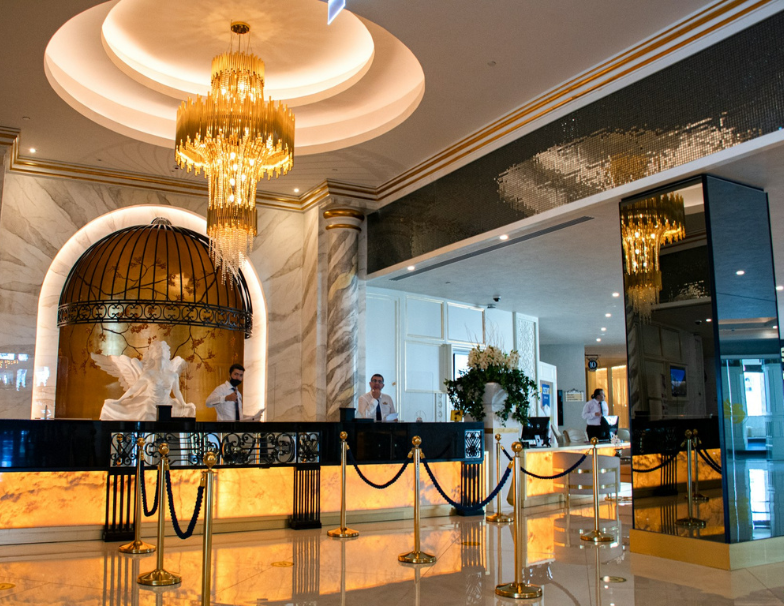Corporate Speakers: A Comprehensive Guide to Fees and Value

Corporate speakers drive engagement and learning at business events such as offsites and retreats. Professionals attend these events to gain insights, network, and learn from experienced corporate speakers. This guide covers their roles, types, fees, and tips for selecting the perfect speaker for your event.
Key Takeaways
- Corporate speakers play a crucial role in enhancing business events by providing expertise, inspiration, and insights aligned with audience needs.
- Speaker fees are influenced by factors such as experience, event size, format, and the level of customization required for presentations.
- Effective budgeting for corporate speakers involves establishing a clear budget framework and considering practical tips for managing expenses, ensuring a successful event without overspending.
The Role of Corporate Speakers in Company Retreats

Corporate speakers play a central role in the success of company retreats, setting the tone for reflection, learning, and team alignment. A well-chosen keynote speaker is especially impactful, as they help articulate the retreat’s core theme—whether it's leadership development, strategic planning, or cultural transformation—in a way that resonates with attendees. By combining subject matter expertise with authentic delivery, effective speakers create space for meaningful dialogue, spark new ideas, and reinforce organizational goals, helping to transform the retreat from a series of sessions into a cohesive, purpose-driven experience. Effective use of body language enhances their ability to connect with audiences and build confidence, further strengthening their presence and engagement. Keynotes play a crucial role in enhancing the overall experience.
Expert professional speakers provide valuable insights that can significantly enhance an organization’s performance and competitiveness. Their deep knowledge and speaking experience enable them to address industry-specific challenges and opportunities, making them indispensable at conferences and seminars, including various speaking engagements. These speakers empower attendees to drive business growth and stay ahead of the curve by sharing cutting-edge information and innovative strategies.
Mental health speakers emphasize the importance of employee well-being, addressing topics such as resilience, personal growth, and workplace happiness. Their contributions as a mental health advocate are crucial in promoting a positive work environment and fostering a culture of care and support within organizations. Prioritizing mental health allows companies to enhance productivity and employee satisfaction, resulting in a more engaged and motivated workforce.
Types of Corporate Speakers

Corporate speakers come in various forms, each bringing their unique strengths to the table. Broadly, they can be categorized into three main types:
- Motivational speakers: Ideal for energizing and inspiring audiences.
- Industry experts: Provide in-depth knowledge on specific topics.
- Leadership speakers: Focus on effective leadership practices and team management.
The choice of speaker largely depends on the goals of the event and the message you wish to impart.
Choosing the right type of corporate speaker can significantly impact the success of your event. It’s essential to consider the audience’s needs and the desired outcomes when selecting a speaker. Whether you aim to inspire, inform, or lead, there’s a perfect speaker for every occasion.
Let’s delve deeper into each category to understand their roles and the value they bring to business events.
Motivational Speakers
Motivational speakers play a vital role in corporate retreats by inspiring and energizing teams, fostering a mindset of resilience, growth, and collaboration. Through compelling personal stories and relatable experiences, they connect with attendees on a human level, encouraging individuals to embrace challenges, strengthen their confidence, and contribute more meaningfully to team goals. Their presence can help reset perspectives, reinforce company values, and build momentum for post-retreat action, making them a powerful catalyst for both personal and organizational growth. Notable motivational speakers like Vernice “FlyGirl” Armour, America’s first African American female combat pilot, and Bryan Stevenson, founder of the Equal Justice Initiative, use their experiences to ignite passion and drive in their audiences.
Other speakers, such as Eric Thomas and Cassandra Worthy, emphasize success strategies that motivate individuals to take action and achieve their goals. These speakers’ ability to connect on a personal level makes their messages more impactful, leaving a lasting impression on attendees.
Motivational speakers create an atmosphere of excitement and optimism by infusing energy and inspiration into their presentations, which is vital for a successful business event that attendees can expect, making the main draw of the occasion even more compelling.
Industry Experts
Industry experts add significant value to company retreats by offering informed perspectives on current trends, emerging challenges, and sector-specific opportunities. Their deep expertise allows them to address issues that are directly relevant to the organization’s goals, market position, and strategic direction. By sharing real-world examples and actionable insights, these speakers help participants contextualize their roles within the broader industry landscape, enabling more informed discussions, better decision-making, and stronger alignment between internal initiatives and external realities. For example, Obi Felten focuses on the intersection of innovation, technology, and practical implementation, while Scott Dadich is known for his expertise in design and technology, promoting innovation through creative thinking.
Other notable industry experts include Stephanie J. Creary, who specializes in diversity, equity, and inclusion, and Vikram Mansharamani, a global trend-watcher and author focusing on macro trends and their impact on business strategy.
Alex Klein, known for his work in education technology, and Ian Khan, who discusses the future of technology and emerging trends, are also prominent figures. Their expertise helps businesses stay informed and prepared for future developments, making them essential contributors to any corporate event.
Leadership Speakers
Leadership speakers focus on effective leadership practices, emphasizing team management and resilience in their presentations. They provide valuable insights into building strong teams, fostering collaboration, and navigating challenges with confidence. Leadership speakers inspire attendees to enhance their leadership skills and drive organizational success by sharing their experiences and strategies.
These speakers are particularly beneficial for events aimed at developing leadership capabilities and promoting a culture of excellence within the organization.
Factors Influencing Corporate Speaker Fees
Several factors influence the fees charged by corporate speakers, making it essential to understand these variables when planning your event. The speaker’s experience, reputation, and the type of event are primary determinants. Experienced and high-profile speakers often command higher fees due to their established reputation and unique content. Clients typically have an expected fee range in mind, and speakers who deliver value that exceeds what is expected can often justify higher fees.
Factors that can affect the fees include:
- The format of the event—whether in-person or virtual, with virtual events generally costing less.
- Customization, as tailoring a presentation to fit the specific needs of an audience requires additional effort and resources.
- Engagement length, which also influences the overall fee.
Logistical costs, such as travel expenses and accommodation, including a hotel room, also play a role, especially for in-person events. Understanding these factors can help event organizers budget effectively and ensure they get the best value for their investment.
Experience and Reputation
The experience and reputation of a speaker significantly influence their fees. Typically, an experienced speaker charges between $5,000 and $25,000, depending on their level of expertise and recognition. High-profile keynote speakers, known for their exclusivity and unique content, can have fees ranging from $5,000 to $10,000 or even higher. As speakers gain more experience and build their reputation, they can command higher fees, reflecting their value and the impact they bring to events.
Emerging speakers may charge a few thousand dollars, while established names can demand tens of thousands. This variation in fees highlights the importance of considering a speaker’s background and track record when budgeting for your event. Investing in experienced and reputable speakers ensures a high-quality experience for the audience, making the cost worthwhile.
Event Size and Format
The size and format of the event also significantly affect speaker fees. Keynote addresses, which often serve as the centerpiece of conferences and corporate events, typically come with higher fees than other formats. For instance, fees for guest speakers at smaller or more intimate retreats can vary, often being lower due to the reduced scale and scope of the engagement.
Virtual events usually have a different fee structure compared to in-person or live events. Since virtual events do not require travel and accommodation, the fees are generally lower, ranging from $500 to $2,000. In contrast, live events often justify higher speaker fees due to the enhanced audience experience and additional logistical requirements. This reduction for virtual events reflects the decreased time commitment and logistical effort involved. Thus, event organizers can leverage virtual formats to engage high-quality speakers at a fraction of the cost.
Customization and Engagement
Customization of presentations can significantly impact speaker fees. When speakers tailor their content to address specific themes, needs, or goals of the event, it often requires additional effort and resources. This personalized approach allows speakers to connect more deeply with their audience, thereby enhancing the overall impact of their presentation.
As a result, the increased preparation and customization can lead to higher fees, reflecting the added additional costs and more value brought to the engagement.
How to Budget for Corporate Speakers

Budgeting for corporate speakers is a crucial aspect of event planning, ensuring a balance between financial constraints and the desired impact of the event. When budgeting, it's important to consider whether the speaking engagement is paid or unpaid, as this distinction affects both overall costs and the selection of speakers. By establishing a clear budget framework, event organizers can allocate funds effectively, ensuring that financial limitations do not compromise the quality and success of the event. A strategic approach to budgeting, informed by extensive industry experience, can help in managing costs while achieving event objectives.
Defining the purpose of the event is the first step in guiding speaker selection and budgeting. Understanding the goals and desired outcomes helps in prioritizing spending and making informed decisions about the type of speakers to hire. Additionally, leveraging resources like pre-negotiated rates and top-tier planning support can provide significant savings and enhance the overall planning process.
Establishing a Budget Framework
Creating a budget framework involves aligning the event goals with the financial plan. Event organizers and corporate retreat planners should consider the following when budgeting for speakers:
- Research attendee fees to gain insights into fair speaking fees, ensuring that the selected speakers align with the audience’s financial capabilities.
- For virtual events, speaker fees typically range from 50% to 70% less than in-person events, making them a cost-effective option. This significant difference highlights the importance of considering the event format when budgeting for a speaker fee.
It is crucial to clearly define and negotiate the speaker's fee in both the budget and the contract to avoid misunderstandings about costs, scope of work, and compensation.
It is also essential to account for the amount of preparation required for the speaker, as more extensive preparation generally leads to higher costs. Event organizers often keep their speaker budgets confidential to mitigate financial risks related to paying ticket sales and money.
By establishing a comprehensive budget framework, organizers can ensure a balanced allocation of resources, maximizing the event’s success without overspending.
Practical Budgeting Tips
Incorporating practical budgeting tips can further enhance the effectiveness of your financial plan. Speakers may offer lower costs or create incentives during slow seasons, helping organizations manage their budgets more efficiently. This flexibility can be particularly beneficial for events planned during off-peak periods, allowing organizers to secure high-quality speakers at reduced rates.
Allocating a contingency fund is another crucial aspect of practical budgeting. Each speaking gig may have unique costs and requirements that should be considered in the budget. This fund can accommodate unexpected expenses related to speaker engagements, such as last-minute travel changes or additional customization requests. Setting aside extra funds prepares event organizers for unforeseen costs, maintaining the event’s integrity and success without financial strain.
Popular Corporate Speaker Categories and Their Fees

Corporate speakers can be grouped into several popular categories, each with distinct fee ranges. Motivational, keynote, and virtual speakers are among the main categories, with fees varying significantly based on the speaker’s recognition and expertise. Understanding the typical fee ranges for each category can help event organizers budget more effectively and choose the right speakers for their retreats and events.
A speaker's website is a valuable resource for event organizers to review categories, fee ranges, and speaker profiles.
Fee ranges can vary depending on specific niches and industries, with some speakers commanding higher fees due to their specialized knowledge or high demand. These approximations provide a helpful starting point for budgeting, though it’s important to account for outliers who may charge significantly more or less than the average.
Let’s explore the fee structures for some of the most popular categories of corporate speakers.
Business and Corporate Speakers
Business and corporate speakers often address topics related to leadership, teamwork, and industry-specific challenges. Notable speakers in this category include:
- Sherri Coale, who provides insights on leadership and teamwork
- Louie Giglio, who speaks on faith and mental health
- Marc Prensky, who addresses faith, education, and preparing for the future
- Ian Khan, who focuses on the future of business and emerging technologies, and is also a TEDx speaker.
These speakers bring significant value perspectives that can drive business growth and innovation.
The fees for business and corporate speakers can vary widely, with famous motivational speakers and notable figures typically charging from $100,000 to unlimited, depending on their demand and reputation. Different industries may necessitate varied fee structures to cater to diverse audience expectations and budgets. Larger events usually require a higher budget for speakers, reflecting the scale and profile of the audience, including the speaker’s fee.
Innovation and Technology Speakers
Innovation and technology speakers focus on the practical application of technological advancements in various industries. These speakers are often at the forefront of emerging trends, providing insights that can help businesses stay competitive and innovative. Their expertise covers a wide range of topics, from digital transformation to future trends and technological disruptions.
The fee range for innovation and technology speakers can often align with their level of recognition and expertise. High-profile speakers in this category may command higher fees due to their specialized knowledge and the demand for their insights. Event organizers should consider the value these speakers bring in terms of driving innovation and staying ahead of industry trends when budgeting for their events.
Mental Health and Wellness Speakers
Mental health and wellness speakers play a crucial role in promoting employee well-being initiatives within corporate environments. Notable speakers include:
- Leana Wen, who speaks about healthcare and public health policy
- Silvia Garcia, who focuses on happiness and creating positive work environments
- Amanda Lipp, who addresses mental health and social change, illustrating how societal shifts impact workplace well-being
Many mental health speakers also emphasize social impact, advocating for positive change in the workplace and society.
These speakers provide valuable insights that can enhance workplace dynamics.
Other prominent figures include Mel Robbins, who shares insights on mental health and personal development, and David Goggins, known for his talks on mental toughness and resilience.
By incorporating mental health and wellness speakers, companies can significantly enhance employee engagement, productivity, and overall workplace atmosphere. The fees for these speakers can vary, reflecting the importance of their contributions to corporate well-being.
Hiring Corporate Speakers: Best Practices

Hiring corporate speakers involves a series of best practices to ensure a successful engagement. When hiring a guest speaker for virtual or in-person events, it is important to negotiate terms carefully and establish clear contracts to ensure value for both parties. Motivational speeches from corporate speakers can significantly enhance audience engagement, making events more impactful. Flexibility in speaker fees, which can be negotiated based on various factors like promotional opportunities and client relationships, is an essential aspect of the hiring process.
Professionalism and precision in the hiring process are crucial. Consulting with past speakers can provide valuable recommendations on suitable new speakers, helping event organizers make informed decisions and maximize the value of their speaking gigs.
Research and Selection
Researching and selecting the right speaker is a critical step in the hiring process. Consider the following steps:
- Verify the speaker’s credentials and professional affiliations to ensure their credibility.
- Request testimonials or references from previous engagements to assess the speaker’s effectiveness and suitability for your event.
- If possible, watch the speaker perform live or view recordings of their presentations to evaluate their skills and delivery style.
A speaker’s title should convey clear expectations about the talk, helping to align their presentation with the event’s goals and audience’s interests. Thoroughly researching potential speakers allows event organizers and company retreat planners to select individuals who will resonate with their audience and contribute significantly to the event’s success.
Negotiation and Contracts
Negotiating speaker fees requires a respectful and informed approach. Consider the following steps:
- Be prepared to bargain respectfully, taking into account the speaker’s experience and the value they bring to your event.
- Conduct your own research to determine an appropriate speaking fee based on event attendee fees and sponsorship rates.
- Understand that fees are often negotiated with the speaker’s booking agent.
- Have a clear understanding of average pay from previous engagements.
Creating a transparent fee structure can enhance client trust and limit negotiations. Include the scope of work, due dates, and circumstances for unmet deadlines in the speaker contract to ensure clarity and mutual understanding.
Providing detailed information about the event type facilitates better customization, ensuring the speaker’s presentation aligns with the event’s objectives and audience’s needs.
Maximizing Speaker Value
Maximizing the value of corporate speakers involves strategic planning and engagement tactics to ensure the audience gains the most from their presence during a speaking engagement. Focusing on the audience’s needs can significantly enhance the value of a presentation, making it more relevant and impactful.
Aligning the speaker’s content with the event’s goals and participants’ interests ensures a memorable and valuable experience for all attending attendees.
Collaboration and Co-Authorship Opportunities
Collaboration and co-authorship present exciting avenues for keynote speakers to amplify their impact and deliver even more significant value to their audiences. By joining forces with other speakers, industry experts, or thought leaders, keynote speakers can create innovative content, share diverse perspectives, and reach new segments within their industry. These partnerships not only enhance the speaker’s personal brand but also provide audiences with richer, more comprehensive insights during keynotes and other speaking engagements.
Working collaboratively allows keynote speakers to tap into the expertise of others, resulting in content that is both authoritative and engaging. Whether it’s co-developing a new product, launching a joint event, or sharing the stage at a major conference, these collaborations can set speakers apart as leaders in their field and deliver exceptional value to event organizers and attendees alike.
Joint Content Creation
Joint content creation is a powerful strategy for keynote speakers looking to expand their influence and showcase their expertise. By partnering with other speakers, industry experts, or even a Pulitzer Prize-winning journalist, keynote speakers can co-author books, produce insightful articles, or launch engaging podcasts and video series. For example, a keynote speaker might team up with a TEDx speaker to create a podcast that explores emerging trends in their industry, or co-author a book that combines their unique perspectives and experiences.
These collaborative projects not only broaden the reach of each speaker but also provide audiences with a richer, more diverse range of ideas and solutions. By leveraging the strengths and expertise of other speakers and industry experts, keynote speakers can deliver content that resonates deeply with their audience and positions them as go-to authorities in their field.
Long-Term Partnerships
Long-term partnerships offer keynote speakers the opportunity to build lasting relationships with other speakers, authors, and industry experts. These ongoing collaborations can lead to the development of new products, services, or educational programs that drive business growth and establish the speakers as thought leaders within their industry. For instance, a keynote speaker might partner with a Columbia Business School professor to design a series of online courses, or collaborate with a chief growth officer to create a comprehensive business growth strategy for corporate clients.
Such partnerships enable keynote speakers to continuously innovate and provide fresh, relevant content to their audiences. By working closely with other experts over time, speakers can deepen their expertise, expand their professional network, and consistently deliver significant value to event organizers and attendees.
Summary
Corporate speakers play a vital role in the success of business events, offering unique insights, inspiration, and practical knowledge that can drive engagement and growth. Understanding the types of speakers, the factors influencing their fees, and effective budgeting strategies are crucial for event organizers aiming to create impactful events. By selecting the right speakers and following best practices in hiring and negotiation, organizers can maximize the value these professionals bring to their events.
In conclusion, investing in the right corporate speakers can elevate your event, leaving a lasting impression on attendees and fostering a culture of learning and innovation. We hope this guide has equipped you with the knowledge and confidence to navigate speaker fees and make informed decisions. Platforms like Offsite simplify the process by curating experienced speakers and aligning talent with the goals of your company retreat, helping you create truly memorable and high-impact experiences. As you plan your next event, remember that the right speaker can transform it from ordinary to extraordinary, making it a memorable and valuable experience for all involved.
FAQs
- What factors influence corporate speaker fees?
Corporate speaker fees are primarily influenced by the speaker's experience and reputation, the type of event, the level of customization required for the presentation, and any associated logistical costs. Understanding these factors can help in budgeting for such engagements effectively.
- How can I budget effectively for corporate speakers?
To budget effectively for corporate speakers, establish a clear framework that aligns event goals with financial plans while researching speaker fees and setting aside contingency funds for unexpected expenses. This strategic approach ensures you stay within budget while securing quality speakers.
- What are the typical fee ranges for business and corporate speakers?
Business and corporate speaker fees typically range from $10,000 to upwards of $100,000, with some renowned speakers charging more based on their expertise and reputation. It's essential to consider both the speaker's experience and your budget when planning an event.
- What are some best practices for hiring corporate speakers?
To ensure a successful hiring process for corporate speakers, verify their credentials, request testimonials, and watch live performances. Additionally, negotiate fees respectfully and create detailed contracts to outline expectations.
You may also like
Unique spaces for your next offsite
Find distinctive venues for your upcoming corporate retreat.
Stay Updated with Our Insights
Get exclusive content and valuable updates directly to you.







